#Online Marketing 2019
Explore tagged Tumblr posts
Text
Thomas going from defending Alastair to his friends and doubling down even when they all obviously disagree with him and wistfully remarking that he "like[s] his nonsense" in 1901 to saying him and Alastair are definitely not friends & that Alastair is objectively awful & debating if he should even speak to him in 1902.... like that has to be one of the most bizarre changes in character that has not and will probably never will be explained or even acknowledged
#God it makes me so mad! thinking about what we could have had....#cc pretends that it never happened but I remember!!! I know!!!#cast long shadows thomas I will always mourn you </3#i assume the change was because cc hates conflict 🙄 heaven forbid your characters not being right all the time#and existing in grey areas that are actually interesting to read about#cls was orginally published online in 2018 & then in print in 2019#like chain of gold came out in 2020! why did it change so much 💀#bella talks#thomas lightwood#alastair carstairs#james herondale#matthew fairchild#christopher lightwood#the last hours#cast long shadows#ghosts of the shadow market#gotsm#tlh#chain of gold#chain of iron#chain of thorns#the shadowhunter chronicles#tsc
129 notes
·
View notes
Text
truly exhausted of “”feminist”” films that don’t even really say anything revolutionary or even explore basic issues in depth and instead rely on 2013 tumblr esque dialogue to make a movie that feels hollow and removed from any subtlety or nuance because it’s too busy throwing basic statements at you like a hand grenade and almost play into these ideas of strawmen and make characters feel less like people and more like caricatures. but then because the film is so heavily based on this idea of being “”feminist”” any criticism is written off as just “hating women” because apparently film criticism dies whenever the movie is supposedly some feminist piece of art. a movie being by women and about women doesn’t inherently make it good and if all you’re doing is providing a more sanitised version of a movie that was made ten, twenty, fifty years ago then your stories are not only bland but also unoriginal.
#anyway i watched black christmas 2019 and. lmao.#also not for nothing but surely it undoes the entire point of your film#the point being Men Are Evil And Use Their Power And Privilege To Abuse Women#to then make the actions of the men in the movie the result of some fucking curse????#because a guy 200 years ago did pagan rituals????#disappointing because the idea of it sounds so good on paper. women murder evil rapist fratboys <3#but instead we got terminally online dialogue and some stupid supernatural plot and like. terrible filmmaking.#also they did themselves no favours by marketing it as a black christmas remake#like what did it have in common besides sorority girls being murdered and being set at christmas#also original black christmas was arguably more feminist despite being made by a man in the 1970s but whatever#at least cary elwes had fun
164 notes
·
View notes
Text

#just when i thought my distaste for the way social media / the internet has become it keeps getting worse#i’m mad. the search bar in instagram changing to meta ai was the trigger for my incoming rant#i wish advertising and marketing didn’t follow us into the internet#i wish ads didn’t get into instagram facebook twitter tumblr etc#i wish all social media platforms didn’t need to have advertisements to survive and keep going as a site#i wish companies and corporations (you know which ones) didn’t pander and infiltrate and poison our entertainment#i wish ai was more like jarvis. like THAT kind of tool. not a tool that’ll replace a human’s unique touch#i wish some people would stop and see and realize all those who have been crucified since 2019 aren’t what the loud few online say they are#i just want to burn social media. i hate the state of it. i’ve been thinking about deleting everything but if i do i’m cut off from society#the conundrum…#meme#gif
1 note
·
View note
Link
The digital transformation is a key factor driving factor in the online recruitment market. The market for online permanent recruitment dominated the...
#adroit market research#online recruitment#online recruitment market#online recruitment 2019#online recruitment trends
0 notes
Text
Kickstarting a book to end enshittification, because Amazon will not carry it

My next book is The Internet Con: How to Seize the Means of Computation: it’s a Big Tech disassembly manual that explains how to disenshittify the web and bring back the old good internet. The hardcover comes from Verso on Sept 5, but the audiobook comes from me — because Amazon refuses to sell my audio:
https://www.kickstarter.com/projects/doctorow/the-internet-con-how-to-seize-the-means-of-computation
Amazon owns Audible, the monopoly audiobook platform that controls >90% of the audio market. They require mandatory DRM for every book sold, locking those books forever to Amazon’s monopoly platform. If you break up with Amazon, you have to throw away your entire audiobook library.
That’s a hell of a lot of leverage to hand to any company, let alone a rapacious monopoly that ran a program targeting small publishers called “Project Gazelle,” where execs were ordered to attack indie publishers “the way a cheetah would pursue a sickly gazelle”:
https://www.businessinsider.com/sadistic-amazon-treated-book-sellers-the-way-a-cheetah-would-pursue-a-sickly-gazelle-2013-10
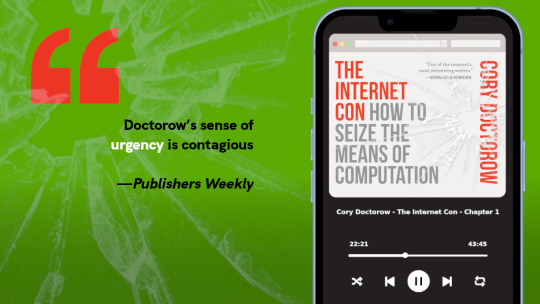
[Image ID: Journalist and novelist Doctorow (Red Team Blues) details a plan for how to break up Big Tech in this impassioned and perceptive manifesto….Doctorow’s sense of urgency is contagious -Publishers Weekly]
I won’t sell my work with DRM, because DRM is key to the enshittification of the internet. Enshittification is why the old, good internet died and became “five giant websites filled with screenshots of the other four” (h/t Tom Eastman). When a tech company can lock in its users and suppliers, it can drain value from both sides, using DRM and other lock-in gimmicks to keep their business even as they grow ever more miserable on the platform.
Here is how platforms die: first, they are good to their users; then they abuse their users to make things better for their business customers; finally, they abuse those business customers to claw back all the value for themselves. Then, they die:
https://pluralistic.net/2023/01/21/potemkin-ai/#hey-guys
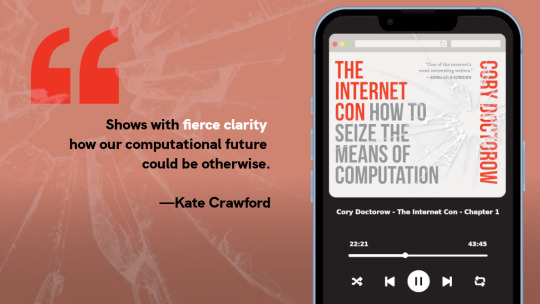
[Image ID: A brilliant barn burner of a book. Cory is one of the sharpest tech critics, and he shows with fierce clarity how our computational future could be otherwise -Kate Crawford, author of The Atlas of AI”]
The Internet Con isn’t just an analysis of where enshittification comes from: it’s a detailed, shovel-ready policy prescription for halting enshittification, throwing it into reverse and bringing back the old, good internet.
How do we do that? With interoperability: the ability to plug new technology into those crapulent, decaying platform. Interop lets you choose which parts of the service you want and block the parts you don’t (think of how an adblocker lets you take the take-it-or-leave “offer” from a website and reply with “How about nah?”):
https://www.eff.org/deeplinks/2019/07/adblocking-how-about-nah
But interop isn’t just about making platforms less terrible — it’s an explosive charge that demolishes walled gardens. With interop, you can leave a social media service, but keep talking to the people who stay. With interop, you can leave your mobile platform, but bring your apps and media with you to a rival’s service. With interop, you can break up with Amazon, and still keep your audiobooks.
So, if interop is so great, why isn’t it everywhere?
Well, it used to be. Interop is how Microsoft became the dominant operating system:
https://www.eff.org/deeplinks/2019/06/adversarial-interoperability-reviving-elegant-weapon-more-civilized-age-slay
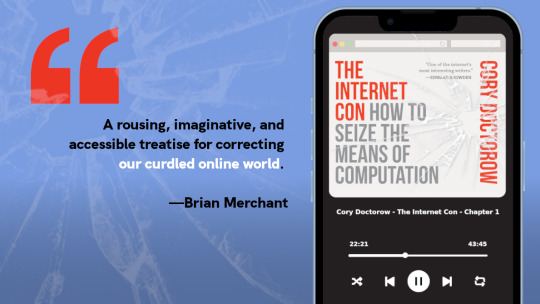
[Image ID: Nobody gets the internet-both the nuts and bolts that make it hum and the laws that shaped it into the mess it is-quite like Cory, and no one’s better qualified to deliver us a user manual for fixing it. That’s The Internet Con: a rousing, imaginative, and accessible treatise for correcting our curdled online world. If you care about the internet, get ready to dedicate yourself to making interoperability a reality. -Brian Merchant, author of Blood in the Machine]
It’s how Apple saved itself from Microsoft’s vicious campaign to destroy it:
https://www.eff.org/deeplinks/2019/06/adversarial-interoperability-reviving-elegant-weapon-more-civilized-age-slay
Every tech giant used interop to grow, and then every tech giant promptly turned around and attacked interoperators. Every pirate wants to be an admiral. When Big Tech did it, that was progress; when you do it back to Big Tech, that’s piracy. The tech giants used their monopoly power to make interop without permission illegal, creating a kind of “felony contempt of business model” (h/t Jay Freeman).
The Internet Con describes how this came to pass, but, more importantly, it tells us how to fix it. It lays out how we can combine different kinds of interop requirements (like the EU’s Digital Markets Act and Massachusetts’s Right to Repair law) with protections for reverse-engineering and other guerrilla tactics to create a system that is strong without being brittle, hard to cheat on and easy to enforce.
What’s more, this book explains how to get these policies: what existing legislative, regulatory and judicial powers can be invoked to make them a reality. Because we are living through the Great Enshittification, and crises erupt every ten seconds, and when those crises occur, the “good ideas lying around” can move from the fringes to the center in an eyeblink:
https://pluralistic.net/2023/06/12/only-a-crisis/#lets-gooooo

[Image ID: Thoughtfully written and patiently presented, The Internet Con explains how the promise of a free and open internet was lost to predatory business practices and the rush to commodify every aspect of our lives. An essential read for anyone that wants to understand how we lost control of our digital spaces and infrastructure to Silicon Valley’s tech giants, and how we can start fighting to get it back. -Tim Maughan, author of INFINITE DETAIL]
After all, we’ve known Big Tech was rotten for years, but we had no idea what to do about it. Every time a Big Tech colossus did something ghastly to millions or billions of people, we tried to fix the tech company. There’s no fixing the tech companies. They need to burn. The way to make users safe from Big Tech predators isn’t to make those predators behave better — it’s to evacuate those users:
https://pluralistic.net/2023/07/18/urban-wildlife-interface/#combustible-walled-gardens
I’ve been campaigning for human rights in the digital world for more than 20 years; I’ve been EFF’s European Director, representing the public interest at the EU, the UN, Westminster, Ottawa and DC. This is the subject I’ve devoted my life to, and I live my principles. I won’t let my books be sold with DRM, which means that Audible won’t carry my audiobooks. My agent tells me that this decision has cost me enough money to pay off my mortgage and put my kid through college. That’s a price I’m willing to pay if it means that my books aren’t enshittification bait.
But not selling on Audible has another cost, one that’s more important to me: a lot of readers prefer audiobooks and 9 out of 10 of those readers start and end their searches on Audible. When they don’t find an author there, they assume no audiobook exists, period. It got so bad I put up an audiobook on Amazon — me, reading an essay, explaining how Audible rips off writers and readers. It’s called “Why None of My Audiobooks Are For Sale on Audible”:
https://pluralistic.net/2022/07/25/can-you-hear-me-now/#acx-ripoff
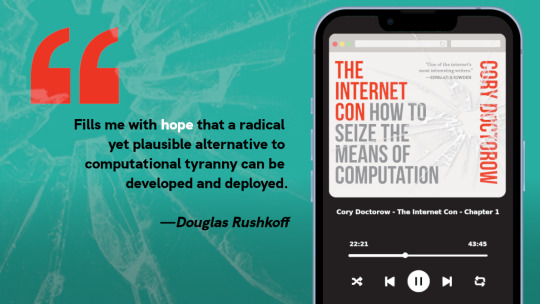
[Image ID: Doctorow has been thinking longer and smarter than anyone else I know about how we create and exchange value in a digital age. -Douglas Rushkoff, author of Present Shock]
To get my audiobooks into readers’ ears, I pre-sell them on Kickstarter. This has been wildly successful, both financially and as a means of getting other prominent authors to break up with Amazon and use crowdfunding to fill the gap. Writers like Brandon Sanderson are doing heroic work, smashing Amazon’s monopoly:
https://www.brandonsanderson.com/guest-editorial-cory-doctorow-is-a-bestselling-author-but-audible-wont-carry-his-audiobooks/
And to be frank, I love audiobooks, too. I swim every day as physio for a chronic pain condition, and I listen to 2–3 books/month on my underwater MP3 player, disappearing into an imaginary world as I scull back and forth in my public pool. I’m able to get those audiobooks on my MP3 player thanks to Libro.fm, a DRM-free store that supports indie booksellers all over the world:
https://blog.libro.fm/a-qa-with-mark-pearson-libro-fm-ceo-and-co-founder/
Producing my own audiobooks has been a dream. Working with Skyboat Media, I’ve gotten narrators like @wilwheaton, Amber Benson, @neil-gaiman and Stefan Rudnicki for my work:
https://craphound.com/shop/

[Image ID: “This book is the instruction manual Big Tech doesn’t want you to read. It deconstructs their crummy products, undemocratic business models, rigged legal regimes, and lies. Crack this book and help build something better. -Astra Taylor, author of Democracy May Not Exist, but We’ll Miss It When Its Gone”]
But for this title, I decided that I would read it myself. After all, I’ve been podcasting since 2006, reading my own work aloud every week or so, even as I traveled the world and gave thousands of speeches about the subject of this book. I was excited (and a little trepedatious) at the prospect, but how could I pass up a chance to work with director Gabrielle de Cuir, who has directed everyone from Anne Hathaway to LeVar Burton to Eric Idle?
Reader, I fucking nailed it. I went back to those daily recordings fully prepared to hate them, but they were good — even great (especially after my engineer John Taylor Williams mastered them). Listen for yourself!
https://archive.org/details/cory_doctorow_internet_con_chapter_01
I hope you’ll consider backing this Kickstarter. If you’ve ever read my free, open access, CC-licensed blog posts and novels, or listened to my podcasts, or come to one of my talks and wished there was a way to say thank you, this is it. These crowdfunders make my DRM-free publishing program viable, even as audiobooks grow more central to a writer’s income and even as a single company takes over nearly the entire audiobook market.
Backers can choose from the DRM-free audiobook, DRM-free ebook (EPUB and MOBI) and a hardcover — including a signed, personalized option, fulfilled through the great LA indie bookstore Book Soup:
https://www.kickstarter.com/projects/doctorow/the-internet-con-how-to-seize-the-means-of-computation
What’s more, these ebooks and audiobooks are unlike any you’ll get anywhere else because they are sold without any terms of service or license agreements. As has been the case since time immemorial, when you buy these books, they’re yours, and you are allowed to do anything with them that copyright law permits — give them away, lend them to friends, or simply read them with any technology you choose.
As with my previous Kickstarters, backers can get their audiobooks delivered with an app (from libro.fm) or as a folder of MP3s. That helps people who struggle with “sideloading,” a process that Apple and Google have made progressively harder, even as they force audiobook and ebook sellers to hand over a 30% app tax on every dollar they make:
https://www.kickstarter.com/projects/doctorow/red-team-blues-another-audiobook-that-amazon-wont-sell/posts/3788112
Enshittification is rotting every layer of the tech stack: mobile, payments, hosting, social, delivery, playback. Every tech company is pulling the rug out from under us, using the chokepoints they built between audiences and speakers, artists and fans, to pick all of our pockets.
The Internet Con isn’t just a lament for the internet we lost — it’s a plan to get it back. I hope you’ll get a copy and share it with the people you love, even as the tech platforms choke off your communities to pad their quarterly numbers.

Next weekend (Aug 4-6), I'll be in Austin for Armadillocon, a science fiction convention, where I'm the Guest of Honor:
https://armadillocon.org/d45/

If you'd like an essay-formatted version of this thread to read or share, here's a link to it on pluralistic.net, my surveillance-free, ad-free, tracker-free blog:
https://pluralistic.net/2023/07/31/seize-the-means-of-computation/#the-internet-con

[Image ID: My forthcoming book 'The Internet Con: How to Seize the Means of Computation' in various editions: Verso hardcover, audiobook displayed on a phone, and ebook displayed on an e-ink reader.]
#pluralistic#trustbusting#big tech#gift guide#kickstarter#the internet con#books#audiobooks#enshitiffication#disenshittification#crowdfunders#seize the means of computation#audible#amazon#verso
15K notes
·
View notes
Text
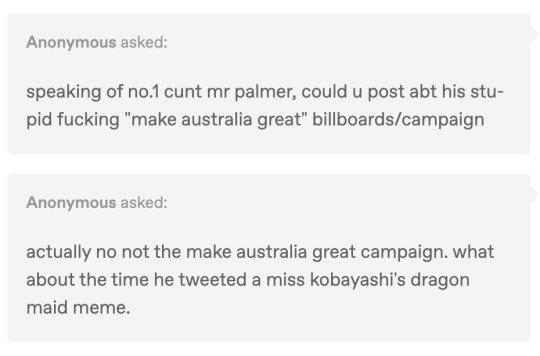

So a bit of background first for our international followers: Clive Palmer is one of Australia's many mining billionaires who like to meddle in our country's politics, and as such he is utterly despised by all of Australia.
Picture for context:

He is most commonly known online by the title "Fatty McFuckhead", (problematic as it may be) because he tried to sue a youtuber for $500,000 for calling him that - and he lost. So the name stuck.

Up until his most recent foray into parliament, the legally certified Fuckhead was best known for his batshit business ventures, such as attempting to build "The Titanic 2" (failed) and trying to build a dinosaur theme park (also failed, but at least nobody got eaten by a T-Rex in this one).
For a very long time Clive played the role of sugar daddy to Australia's largest conservative party, the ironically named Liberal Party, until they had a falling out in 2012 after Clive claimed there was too much money influencing politics (lol), at which point he started his own party, days after saying he totally quit and wasn't fired and he only left because he didn't want to be a distraction.
His initial run at parliament was actually kinda successful, with Palmer's group winning 4 seats, plus a member from the "Motoring Enthusiasts Party" joined them too after accidentally getting elected and not knowing what the fuck to do.
Despite this initial success however, Palmer's party (which ran on basically no platform other than "I'm rich") hit an iceberg (titanic 2 achieved) and seven elected state and federal politicians quit within the first year.

By the time the next federal election rolled around, only one Palmer party candidate was still running for re-election. The most successful of this group - Jaquie Lambie - quit to sit as an independant and is still in parliament today.
Here she is with a painting of herself strangling Clive (she sells signed copies of this)

And here the senator is posting about liking sausage:

Anyway, we're getting to the point: which is the yellow posters. By the 2016 election, just two years after forming, the party was in complete freefall. It won just 0.01% of the vote at their second election, and it was announced shortly after that Clive was quitting politics and the party was being shut down. Australia breathed a sigh of relief.
It was, of course, short lived.
Clive, in desperate need of attention, restarted the party for the 2019 election, fielding candidates in every seat and spending $60 million in advertising in an attempt to win votes.
Every single candidate lost.
It was in this campaign however that Australia really started to fall out of love with Palmer, because most of that $60 million went towards putting up the world's least compelling marketing billboards on almost every single free space in the country.
For a good six months this was basically the only thing you would see in Australia if you went outside:

Clearly Graphic design is his passion. And yes, the genius did just straight up try and copy Trump's homework while changing a few words, hoping nobody would notice.
Very quickly these all got vandalised and it seemed the ad companies didn't care enough to replace them.



We could go on posting examples, there are thousands, but the best is definitely the one Ikea put up shortly after Clive lost the election:

In 2022, Clive's party contested the election AGAIN, this time also opting to send millions on spam text messages to every person in Australia begging for people to vote for him, as well as buying almost every youtube ad for a year, at the cost of $100 million.
He won a whopping one seat.
During this election Clive ran on an anti-lockdown, anti-vax platform with the slogan "freedom, freedom, freedom". That message, however, was slightly undermined when his goons, dressed in 'Freedom!' shirts, made national news for trying to beat up a protester who turned up at a rally dressed as an annoying text message, shouting "pay your workers" at Clive.
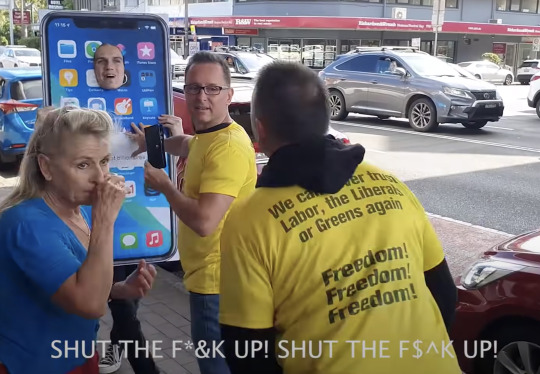
As if that wasn't bad enough, at another rally Clive knocked himself unconscious while trying to jump up on stage, and then a few weeks later was rushed to hospital with covid, while his anti-vax ads were still in regular rotation on TV, at which point it was also leaked to the press that Palmer had been alledgedly trying to buy Hitler's car.
Utterly humiliated, the party deregistered again shortly after the election.
Can't wait until he runs again in 2025.
Anyway, on the other "Clive tweeting Miss Kobayashi's Dragon" thing, we have no idea what that means but here's a screencap:
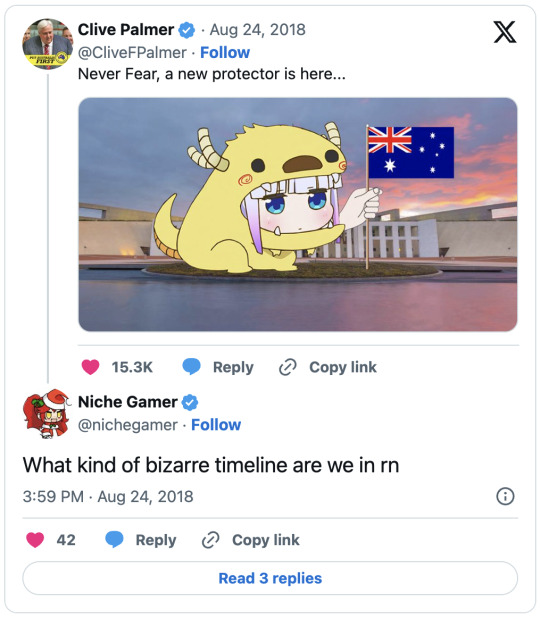
5K notes
·
View notes
Link
#adroit market research#online course provider#online course provider market#online course provider 2018#online course provider 2019
0 notes
Link
#adroit market research#online recruitment#online recruitment market#online recruitment 2019#online recruitment trends
0 notes
Text

[ID: A decorative orange ceramic plate with a pyramid of green herbs and sesame seeds, topped with deep red sumac and more sesame seeds. End ID]
زعتر فلسطيني / Za'tar falastinia (Palestinian spice blend)
Za'tar (زَعْتَر; also transliterated "za'atar," "zaatar" and "zatar") is the name of a family of culinary herbs; it is also the name of a group of spice blends made by mixing these herbs with varying amounts of olive oil, sumac, salt, roasted sesame seeds, and other spices. Palestinian versions of za'tar often include caraway, aniseed, and roasted wheat alongside generous portions of sumac and sesame seeds. The resulting blend is bold, zesty, and aromatic, with a hint of floral sourness from the sumac, and notes of licorice and anise.
Za'tar is considered by Palestinians to have particular national, political, and personal importance, and exists as a symbol of both Israeli oppression and Palestinian home-making and resistance. Its major components, olive oil and wild thyme, are targeted by the settler state in large part due to their importance to ecology, identity, and trade in Palestine—settlers burn and raze Palestinian farmers' olive trees by the thousands each year. A 1977 Israeli law forbade the harvesting of wild herbs within its claimed borders, with violators of the law risking fines and confiscation, injury, and even death from shootings or land mines; in 2006, za'tar was further restricted, such that even its possession in the West Bank was met with confiscation and fines.
Despite the blanket ban on harvesting wild herbs (none of which are endangered), Arabs are the only ones to be charged and fined for the crime. Samir Naamnih calls the ban an attempt to "starve us out," given that foraging is a major source of food for many Palestinians, and that picking and selling herbs is often the sole form of income for impoverished families. Meanwhile, Israeli farmers have domesticated and farmed za'tar on expropriated Palestinian land, selling it (both the herb and the spice mixture) back to Palestinians, and later marketing it abroad as an "Israeli" blend; they thus profit from the ban on wild harvesting of the herb. This farming model, as well as the double standard regarding harvesting, refer back to an idea that Arabs are a primitive people unfit to own the land, because they did not cultivate or develop it as the settlers did (i.e., did not attempt to recreate a European landscape or European models of agriculture); colonizing and settling the land are cast as justified, and even righteous.
The importance of the ban on foraging goes beyond the economic. Raya Ziada, founder of an acroecology nonprofit based in Ramallah, noted in 2019 that "taking away access to [wild herbs] doesn't just debilitate our economy and compromise what we eat. It's symbolic." Za'tar serves variously as a symbol of Palestinians' connection to the land and to nature; of Israeli colonial dispossession and theft; of the Palestinian home ("It’s a sign of a Palestinian home that has za’tar in it"); and of resistance to the colonial regime, as many Palestinians have continued to forage herbs such as za'tar and akkoub in the decades since the 1977 ban. Resistance to oppression will continue as long as there is oppression.
Palestine Action has called for bail fund donations to aid in their storming, occupying, shutting down, and dismantling of factories and offices owned by Israeli arms manufacturer Elbit Systems. Also contact your representatives in the USA, UK, and Canada.
Ingredients:
Za'tar (Origanum syriacum), 250g once dried (about 4 cups packed)
250g (1 2/3 cup) sesame seeds
170g (3/4 cup) Levantine sumac berries, or ground sumac (Rhus coriaria)
100g (1/2 cup) wheat berries (optional)
2 Tbsp olive oil
1 Tbsp aniseed (optional)
1/2 Tbsp caraway seeds (optional)
Levantine wild thyme (also known as Bible hyssop, Syrian oregano, and Lebanese oregano) may be purchased dried online. You may also be able to find some dried at a halal grocery store, where it will be labelled "زعتر" (za'tar) and "thym," "thyme," or "oregano." Check to make sure that what you're buying is just the herb and not the prepared mixture, which is also called "زعتر." Also ensure that what you're buying is not a product of Israel.
If you don't have access to Levantine thyme, Greek or Turkish oregano are good substitutes.
Wheat berries are the wheat kernel that is ground to produce flour. They may be available sold as "wheat berries" at a speciality health foods store. They may be omitted, or replaced with pre-ground whole wheat flour.
Instructions:
1. Harvest wild thyme and remove the stems from the leaves. Wash the leaves in a large bowl of water and pat dry; leave in a single layer in the sun for four days or so, until brittle. Skip this step if using pre-dried herbs.
2. Crumble leaves by rubbing them between the palms of your hands until they are very fine. Pass through a sieve or flour sifter into a large bowl, re-crumbling any leaves that are too coarse to get through.
Crumbling between the hands is an older method. You may also use a blender or food processor to grind the leaves.
3. Mix the sifted thyme with a drizzle of olive oil and work it between your hands until incorporated.
4. Briefly toast sumac berries, caraway seeds, and aniseed in a dry skillet over medium heat, then grind them to a fine powder in a mortar and pestle or a spice mill.
5. Toast sesame seeds in a dry skillet over medium heat, stirring constantly, until deeply golden brown.
6. (Optional) In a dry skillet on medium-low, toast wheat berries, stirring constantly, until they are deeply golden brown. Grind to a fine powder in a spice mill. If using ground flour, toast on low, stirring constantly, until browned.

Some people in the Levant bring their wheat to a local mill to be ground after toasting, as it produces a finer and more consistent texture.
7. Mix all ingredients together and work between your hands to incorporate.
Store za'tar in an airtight jar at room temperature. Mix with olive oil and use as a dipping sauce with bread.
2K notes
·
View notes
Link
The digital transformation is a key factor driving factor in the online recruitment market. The market for online permanent recruitment dominated the market. However, the part-time job recruitment market is expected to grow with the highest CAGR of 8.3% during the forecast period
#adroit market research#online recruitment#online recruitment market#online recruitment 2019#online recruitment trends
0 notes
Video
youtube
How to get healthy backlinks to your websiteFor great turorials and blogs on Wordpress, E-commerce and SEO topics and learning, go to; https://ecomhardy.com/ I. Introduction Importance of backlinks in SEO: Backlinks are an important factor in search engine optimization (SEO). When other websites link to your website, it indicates to search engines that your website is a valuable resource and can help improve your search engine rankings. Definition of a "healthy" backlink: A healthy backlink is a link from a reputable, authoritative website in your industry. These types of backlinks are more valuable than links from low-quality or spammy websites, as they can help boost your credibility and improve your search engine rankings. II. Identify your target audience and create valuable content Research your target audience and their interests: In order to attract backlinks, it's important to understand your target audience and what types of content they are interested in. Conduct market research, analyze your website traffic, and pay attention to the types of content that receive the most engagement. Create high-quality, original content that will appeal to your target audience: Once you have a good understanding of your target audience, create content that will appeal to them. This could be blog posts, articles, infographics, videos, or any other type of content that is valuable and relevant to your audience. In order to attract backlinks, it's important to create content that is high-quality and original, as this will make it more likely for other websites to want to link to it. III. Use social media and networking to promote your website and content Utilize social media platforms to share your content and attract backlinks: Social media is a great way to promote your website and content, and can also help you attract backlinks. Share your content on social media platforms, and engage with other users in your industry to build relationships and potentially earn backlinks. Participate in online communities and forums related to your industry: Another way to promote your website and content is to participate in online communities and forums related to your industry. These communities can be a great source of backlinks, as well as a way to connect with others in your industry and build your credibility. IV. Utilize guest blogging and collaborations Reach out to other websites and blogs in your industry to offer guest blog posts: One way to earn backlinks is to offer to write guest blog posts for other websites in your industry. This can be a great way to get your content in front of a new audience and potentially earn backlinks. Collaborate with other websites and businesses to create joint content and earn backlinks: Collaborating with other websites and businesses on joint content can also be a great way to earn backlinks. For example, you could create a joint webinar, whitepaper, or other piece of content that both businesses can promote and link to. V. Monitor and track your backlink progress Use tools such as Google Analytics and Ahrefs to track the success of your backlink building efforts: It's important to track your backlink building efforts in order to see what is working and what isn't. Tools like Google Analytics and Ahrefs can help you see which websites are linking to you, and can also provide insight into the quality of those links. Monitor your backlinks to ensure they are high-quality and relevant to your website: It's important to regularly monitor your backlinks to ensure they are high-quality and relevant to your website. If you have low-quality or spammy backlinks, it can actually hurt your search engine rankings, so it's important to remove these links or use the "disavow" tool in Google Search Console to disavow them. VI. Conclusion In conclusion, healthy backlinks are an important factor in SEO. By creating valuable content, utilizing social media and networking, utilizing guest blogging and collaborations, and monitoring and tracking your backlink progress, you can effectively build healthy backlinks to your website and improve your search engine rankings. It's important to remember that the quality of your backlinks is more important than the quantity, so focus on building relationships and creating valuable content that will appeal to your target audience.
#link building#backlinks#seo#seo backlinks#seo link building#link building strategies#online marketing#digital marketing#build backlinks#neil patel#high quality backlinks#how to create backlinks#backlink checker#google seo tools#create backlinks#how to build backlinks#how to get backlinks website backlinks#get backlinks#how to build backlinks 2019#find backlinks#quality backlinks#build high quality backlinks#quality links
1 note
·
View note
Text

Article Link
"Minnetonka first started selling its “Thunderbird” moccasins in 1965. Now, for the first time, they’ve been redesigned by a Native American designer.
It’s one step in the company’s larger work to deal with its history of cultural appropriation. The Minneapolis-based company launched in the 1940s as a small business making souvenirs for roadside gift shops in the region—including Native American-inspired moccasins, though the business wasn’t started or run by Native Americans. The moccasins soon became its biggest seller.

[Photo: Minnetonka]
Adrienne Benjamin, an Anishanaabe artist and community activist who became the company’s “reconciliation advisor,” was initially reluctant when a tribal elder approached her about meeting with the company. Other activists had dismissed the idea that the company would do the work to truly transform. But Benjamin agreed to the meeting, and the conversation convinced her to move forward.
“I sensed a genuine commitment to positive change,” she says. “They had really done their homework as far as understanding and acknowledging the wrong and the appropriation. I think they knew for a long time that things needed to get better, and they just weren’t sure what a first step was.”

Pictured: Lucie Skjefte and son Animikii [Photo: Minnetonka]
In 2020, Minnetonka publicly apologized “for having benefited from selling Native-inspired designs without directly honoring Native culture or communities.” It also said that it was actively recruiting Native Americans to work at the company, reexamining its branding, looking for Native-owned businesses to partner with, continuing to support Native American nonprofits, and that it planned to collaborate with Native American artists and designers.
Benjamin partnered with the company on the first collaboration, a collection of hand-beaded hats, and then recruited the Minneapolis-based designer Lucie Skjefte, a citizen of the Red Lake Nation, who designed the beadwork for another moccasin style and a pair of slippers for the brand. Skjefte says that she felt comfortable working with the company knowing that it had already done work with Benjamin on reconciliation. And she wasn’t a stranger to the brand. “Our grandmothers and our mothers would always look for moccasins in a clutch kind of situation where they didn’t have a pair ready and available to make on their own—then they would buy Minnetonka mocs and walk into a traditional pow wow and wear them,” she says. Her mother, she says, who passed away in 2019, would have been “immensely proud” that Skjefte’s design work was part of the moccasins—and on the new version of the Thunderbird moccasin, one of the company’s top-selling styles.

[Photo: Minnetonka]
“I started thinking about all of those stories, and what resonated with me visually,” Skjefte says. The redesign, she says, is much more detailed and authentic than the previous version. “Through the redesign and beading process, we are actively reclaiming and reconnecting our Animikii or Thunderbird motif with its Indigenous roots,” she says. Skjefte will earn royalties for the design, and Minnetonka will also separately donate a portion of the sale of each shoe to Mni Sota Fund, a nonprofit that helps Native Americans in Minnesota get training and capital for home ownership and entrepreneurship.
Some companies go a step farther—Manitobah Mukluks, based in Canada, has an Indigenous founder and more than half Indigenous staff. (While Minnetonka is actively recruiting more Native American workers, the company says that employees self-report race and it can’t share any data about its current number of Indigenous employees.) Beyond its own line of products, Manitobah also has an online Indigenous Market that features artists who earn 100% of the profit for their work.
White Bear Moccasins, a Native-owned-and-made brand in Montana, makes moccasins from bison hide. Each custom pair can take six to eight hours to make; the shoes cost hundreds of dollars, though they can also be repaired and last as long as a lifetime, says owner Shauna White Bear. In interviews, White Bear has said that she wants “to take our craft back,” from companies like Minnetonka. But she also told Fast Company that she doesn’t think that Minnetonka, as a family-owned business, should have to lose its livelihood now and stop making moccasins.
The situation is arguably different for other fashion brands that might use a Native American symbol—or rip off a Native American design completely—on a single product that could easily be taken off the market. Benjamin says that she has also worked with other companies that have discontinued products.
She sees five steps in the process of reconciliation. First, the person or company who did wrong has to acknowledge the wrong. Then they need to publicly apologize, begin to change behavior, start to rebuild trust, and then, eventually, the wronged party might take the step of forgiveness. Right now, she says, Minnetonka is in the third phase of behavior change. The brand plans to continue to collaborate with Native American designers.
The company can be an example to others on how to listen and build true relationships, Benjamin says. “I think that’s the only way that these relationships are going to get any better—people have to sit down and talk about it,” she says. “People have to be real. People have to apologize. They have to want to reconcile with people.”
The leadership at Minnetonka can also be allies in pushing other companies to do better. “My voice is important at the table as an Indigenous woman,” Benjamin says. “Lucie’s voice is important. But at tables where there’s a majority of people that aren’t Indigenous, sometimes those allies’ voices are more powerful in those spaces, because that means that they’ve signed on to what we’re saying. The power has signed on to moving forward and we agree with ‘Yes, this was wrong.’ That’s the stuff that’s going to change [things] right there.”"
-via FastCompany, February 7, 2024
#indigenous#indigenous artists#indigenous art#moccasins#thunderbird#native american#native american art#cultural appropriation#indigenous peoples#cultural representation#minnesota#minnetonka#minneapolis#red lake nation#ojibwe#anishinaabe#reconciliation#fashion#fashion news#good news#hope#indigenous designers#native artist#indigenous artist
2K notes
·
View notes
Text
Lil Nas X featuring Billy Ray Cyrus - Old Town Road 2019
"Old Town Road" is the debut mainstream single by American rapper Lil Nas X, first released independently in December 2018. After gaining popularity, the single was re-released in March 2019. The rapper also recorded a remix with American country singer Billy Ray Cyrus, which was released on April 5, 2019. Both were included on Lil Nas X's second EP, 7 (2019). Dutch record producer YoungKio composed the instrumental and made it available for purchase online in 2018. It features a sample of "34 Ghosts IV" by the American industrial rockband Nine Inch Nails. The sample was placed behind trap-style Roland TR-808 drums and bass. Lil Nas X purchased the instrumental for US$30 and recorded "Old Town Road" in one day.
The song reached number 19 on the Billboard Hot Country Songs chart before the magazine disqualified it from the chart on the grounds that it did not "fit" the genre, sparking a debate on what constitutes the "definition" of country music. Though "Old Town Road" did not re-enter any country charts, both versions of the song collectively peaked at number 1 on the main Billboard Hot 100, remaining at the top for a record-breaking 19 consecutive weeks; the remix peaked at number 50 on Billboard's Country Airplay chart. "Old Town Road"'s overall run at number one is the longest in chart history, surpassing the previous record of sixteen weeks achieved by both "One Sweet Day" (poll #296) and "Despacito". One or more versions of "Old Town Road" have topped the national singles charts in Australia, Canada, France, Germany, Ireland, the Netherlands, New Zealand, Norway, Switzerland and the UK, and have charted in the top 10 in various other international markets.
The song was certified diamond by the RIAA in October 2019 for selling 10 million total units in the US, the fastest song to be certified diamond. At the 62nd Annual Grammy Awards, the remix featuring Billy Ray Cyrus was nominated for Record of the Year and won Best Pop Duo/Group Performance and Best Music Video. In September 2021, the song set the record for the second-highest certified song in history by the RIAA, at 16× platinum in the US - meaning it accumulated 16 million equivalent song units. The single has sold over 18 million copies worldwide, making it one of the best-selling singles of all time.
"Old Town Road" received a total of 80,6% yes votes!
youtube
768 notes
·
View notes
Text
Realised that both 'Wilbur Cross' and 'John MacNamara' sound like they could be the names of bestselling crime fiction authors. Made these very lazily on my phone using stock photos, so apologies to anyone with an eye for graphic design, but:


Do you see the vision?
Sure hope this doesn't become an AU or anything. Ahem...
John MacNamara led a secretive US military organisation for decades, before retiring after his failure to prevent the 2019 Hatchetfield musical-plague tragedy. MacNamara abandoned his military career and became something of a recluse, working on a fictionalised memoir, Monsters and Men, in an attempt to escape his own guilt. The book's publication met with considerable success, and made MacNamara a favourite of the publishing world - now he's found himself invited to talks and parties that were very much out of his comfort zone. Most of the time he is happy to let his outgoing young agent, Xander Lee, do most of the networking and talking.
It's at one of these parties that John and Xander learn about the new smash hit bestseller taking the Crime/Thriller market by storm. Over a few too many glasses of champagne, smug rival agent Linda Monroe spills the details of her new client, whose debut novel is due to be released this Black Friday.
Critics are calling Made in America an addictive, fast-paced gem - part gritty noir, part political satire, but weirdly none of the reviews seem to say anything about the book's content - just that it's 'a must buy for any fan of crime fiction, and even those new to the genre'. Something about the rave reviews feels off to John. 'Rave' seems to be the operative word. The level of praise, the absolute certainty that 'this book will change your life!!!' quickly becomes a little uncanny. On top of that, John can't find anything about the mysterious 'Wilbur Cross' online - just more and more of the book's apparently omnipresent marketing.
When violent physical fights break out over pre-order copies on the book's release day, John is certain that something supernatural is afoot. He'd sworn never to return to his old life working for PEIP, but it seems that now his old skills and knowledge might be in demand. The fate of humanity may be at stake.
Luckily, he's not the only one who has realised something is up. PEIP were never content to let their former general disappear from their radar, after all. There's more to 'up-and-coming publishing agent Xander Lee' than meets the eye.
57 notes
·
View notes
Link
Easy access, interactive learning, and higher value at cheaper cost is driving the market for online courses across the world. The North America region...
#adroit market research#online course provider#online course provider market#online course provider 2018#online course provider 2019
0 notes
Text
Microsoft pinky swears that THIS TIME they’ll make security a priority

One June 20, I'm live onstage in LOS ANGELES for a recording of the GO FACT YOURSELF podcast. On June 21, I'm doing an ONLINE READING for the LOCUS AWARDS at 16hPT. On June 22, I'll be in OAKLAND, CA for a panel and a keynote at the LOCUS AWARDS.

As the old saying goes, "When someone tells you who they are and you get fooled again, shame on you." That goes double for Microsoft, especially when it comes to security promises.
Microsoft is, was, always has been, and always will be a rotten company. At every turn, throughout their history, they have learned the wrong lessons, over and over again.
That starts from the very earliest days, when the company was still called "Micro-Soft." Young Bill Gates was given a sweetheart deal to supply the operating system for IBM's PC, thanks to his mother's connection. The nepo-baby enlisted his pal, Paul Allen (whom he'd later rip off for billions) and together, they bought someone else's OS (and took credit for creating it – AKA, the "Musk gambit").
Microsoft then proceeded to make a fortune by monopolizing the OS market through illegal, collusive arrangements with the PC clone industry – an industry that only existed because they could source third-party PC ROMs from Phoenix:
https://www.eff.org/deeplinks/2019/08/ibm-pc-compatible-how-adversarial-interoperability-saved-pcs-monopolization
Bill Gates didn't become one of the richest people on earth simply by emerging from a lucky orifice; he also owed his success to vigorous antitrust enforcement. The IBM PC was the company's first major initiative after it was targeted by the DOJ for a 12-year antitrust enforcement action. IBM tapped its vast monopoly profits to fight the DOJ, spending more on outside counsel to fight the DOJ antitrust division than the DOJ spent on all its antitrust lawyers, every year, for 12 years.
IBM's delaying tactic paid off. When Reagan took the White House, he let IBM off the hook. But the company was still seriously scarred by its ordeal, and when the PC project kicked off, the company kept the OS separate from the hardware (one of the DOJ's major issues with IBM's previous behavior was its vertical monopoly on hardware and software). IBM didn't hire Gates and Allen to provide it with DOS because it was incapable of writing a PC operating system: they did it to keep the DOJ from kicking down their door again.
The post-antitrust, gunshy IBM kept delivering dividends for Microsoft. When IBM turned a blind eye to the cloned PC-ROM and allowed companies like Compaq, Dell and Gateway to compete directly with Big Blue, this produced a whole cohort of customers for Microsoft – customers Microsoft could play off on each other, ensuring that every PC sold generated income for Microsoft, creating a wide moat around the OS business that kept other OS vendors out of the market. Why invest in making an OS when every hardware company already had an exclusive arrangement with Microsoft?
The IBM PC story teaches us two things: stronger antitrust enforcement spurs innovation and opens markets for scrappy startups to grow to big, important firms; as do weaker IP protections.
Microsoft learned the opposite: monopolies are wildly profitable; expansive IP protects monopolies; you can violate antitrust laws so long as you have enough monopoly profits rolling in to outspend the government until a Republican bootlicker takes the White House (Microsoft's antitrust ordeal ended after GW Bush stole the 2000 election and dropped the charges against them). Microsoft embodies the idea that you either die a rebel hero or live long enough to become the evil emperor you dethroned.
From the first, Microsoft has pursued three goals:
Get too big to fail;
Get too big to jail;
Get too big to care.
It has succeeded on all three counts. Much of Microsoft's enduring power comes from succeeded IBM as the company that mediocre IT managers can safely buy from without being blamed for the poor quality of Microsoft's products: "Nobody ever got fired for buying Microsoft" is 2024's answer to "Nobody ever got fired for buying IBM."
Microsoft's secret sauce is impunity. The PC companies that bundle Windows with their hardware are held blameless for the glaring defects in Windows. The IT managers who buy company-wide Windows licenses are likewise insulated from the rage of the workers who have to use Windows and other Microsoft products.
Microsoft doesn't have to care if you hate it because, for the most part, it's not selling to you. It's selling to a few decision-makers who can be wined and dined and flattered. And since we all have to use its products, developers have to target its platform if they want to sell us their software.
This rarified position has afforded Microsoft enormous freedom to roll out harebrained "features" that made things briefly attractive for some group of developers it was hoping to tempt into its sticky-trap. Remember when it put a Turing-complete scripting environment into Microsoft Office and unleashed a plague of macro viruses that wiped out years worth of work for entire businesses?
https://web.archive.org/web/20060325224147/http://www3.ca.com/securityadvisor/newsinfo/collateral.aspx?cid=33338
It wasn't just Office; Microsoft's operating systems have harbored festering swamps of godawful defects that were weaponized by trolls, script kiddies, and nation-states:
https://en.wikipedia.org/wiki/EternalBlue
Microsoft blamed everyone except themselves for these defects, claiming that their poor code quality was no worse than others, insisting that the bulging arsenal of Windows-specific malware was the result of being the juiciest target and thus the subject of the most malicious attention.
Even if you take them at their word here, that's still no excuse. Microsoft didn't slip and accidentally become an operating system monopolist. They relentlessly, deliberately, illegally pursued the goal of extinguishing every OS except their own. It's completely foreseeable that this dominance would make their products the subject of continuous attacks.
There's an implicit bargain that every monopolist makes: allow me to dominate my market and I will be a benevolent dictator who spends his windfall profits on maintaining product quality and security. Indeed, if we permit "wasteful competition" to erode the margins of operating system vendors, who will have a surplus sufficient to meet the security investment demands of the digital world?
But monopolists always violate this bargain. When faced with the decision to either invest in quality and security, or hand billions of dollars to their shareholders, they'll always take the latter. Why wouldn't they? Once they have a monopoly, they don't have to worry about losing customers to a competitor, so why invest in customer satisfaction? That's how Google can piss away $80b on a stock buyback and fire 12,000 technical employees at the same time as its flagship search product (with a 90% market-share) is turning into an unusable pile of shit:
https://pluralistic.net/2024/02/21/im-feeling-unlucky/#not-up-to-the-task
Microsoft reneged on this bargain from day one, and they never stopped. When the company moved Office to the cloud, it added an "analytics" suite that lets bosses spy on and stack-rank their employees ("Sorry, fella, Office365 says you're the slowest typist in the company, so you're fired"). Microsoft will also sell you internal data on the Office365 usage of your industry competitors (they'll sell your data to your competitors, too, natch). But most of all, Microsoft harvest, analyzes and sells this data for its own purposes:
https://pluralistic.net/2020/11/25/the-peoples-amazon/#clippys-revenge
Leave aside how creepy, gross and exploitative this is – it's also incredibly reckless. Microsoft is creating a two-way conduit into the majority of the world's businesses that insider threats, security services and hackers can exploit to spy on and wreck Microsoft's customers' business. You don't get more "too big to care" than this.
Or at least, not until now. Microsoft recently announced a product called "Recall" that would record every keystroke, click and screen element, nominally in the name of helping you figure out what you've done and either do it again, or go back and fix it. The problem here is that anyone who gains access to your system – your boss, a spy, a cop, a Microsoft insider, a stalker, an abusive partner or a hacker – now has access to everything, on a platter. Naturally, this system – which Microsoft billed as ultra-secure – was wildly insecure and after a series of blockbuster exploits, the company was forced to hit pause on the rollout:
https://arstechnica.com/gadgets/2024/06/microsoft-delays-data-scraping-recall-feature-again-commits-to-public-beta-test/
For years, Microsoft waged a war on the single most important security practice in software development: transparency. This is the company that branded the GPL Free Software license a "virus" and called open source "a cancer." The company argued that allowing public scrutiny of code would be a disaster because bad guys would spot and weaponize defects.
This is "security through obscurity" and it's an idea that was discredited nearly 500 years ago with the advent of the scientific method. The crux of that method: we are so good at bullshiting ourselves into thinking that our experiment was successful that the only way to make sure we know anything is to tell our enemies what we think we've proved so they can try to tear us down.
Or, as Bruce Schneier puts it: "Anyone can design a security system that you yourself can't think of a way of breaking. That doesn't mean it works, it just means that it works against people stupider than you."
And yet, Microsoft – whose made more widely and consequentially exploited software than anyone else in the history of the human race – claimed that free and open code was insecure, and spent millions on deceptive PR campaigns intended to discredit the scientific method in favor of a kind of software alchemy, in which every coder toils in secret, assuring themselves that drinking mercury is the secret to eternal life.
Access to source code isn't sufficient to make software secure – nothing about access to code guarantees that anyone will review that code and repair its defects. Indeed, there've been some high profile examples of "supply chain attacks" in the free/open source software world:
https://www.securityweek.com/supply-chain-attack-major-linux-distributions-impacted-by-xz-utils-backdoor/
But there's no good argument that this code would have been more secure if it had been harder for the good guys to spot its bugs. When it comes to secure code, transparency is an essential, but it's not a sufficency.
The architects of that campaign are genuinely awful people, and yet they're revered as heroes by Microsoft's current leadership. There's Steve "Linux Is Cancer" Ballmer, star of Propublica's IRS Files, where he is shown to be the king of "tax loss harvesting":
https://pluralistic.net/2023/04/24/tax-loss-harvesting/#mego
And also the most prominent example of the disgusting tax cheats practiced by rich sports-team owners:
https://pluralistic.net/2021/07/08/tuyul-apps/#economic-substance-doctrine
Microsoft may give lip service to open source these days (mostly through buying, stripmining and enclosing Github) but Ballmer's legacy lives on within the company, through its wildly illegal tax-evasion tactics:
https://pluralistic.net/2023/10/13/pour-encoragez-les-autres/#micros-tilde-one
But Ballmer is an angel compared to his boss, Bill Gates, last seen some paragraphs above, stealing the credit for MS DOS from Tim Paterson and billions of dollars from his co-founder Paul Allen. Gates is an odious creep who made billions through corrupt tech industry practices, then used them to wield influence over the world's politics and policy. The Gates Foundation (and Gates personally) invented vaccine apartheid, helped kill access to AIDS vaccines in Sub-Saharan Africa, then repeated the trick to keep covid vaccines out of reach of the Global South:
https://pluralistic.net/2021/04/13/public-interest-pharma/#gates-foundation
The Gates Foundation wants us to think of it as malaria-fighting heroes, but they're also the leaders of the war against public education, and have been key to the replacement of public schools with charter schools, where the poorest kids in America serve as experimental subjects for the failed pet theories of billionaire dilettantes:
https://www.ineteconomics.org/perspectives/blog/millionaire-driven-education-reform-has-failed-heres-what-works
(On a personal level, Gates is also a serial sexual abuser who harassed multiple subordinates into having sexual affairs with him:)
https://www.nytimes.com/2022/01/13/technology/microsoft-sexual-harassment-policy-review.html
The management culture of Microsoft started rotten and never improved. It's a company with corruption and monopoly in its blood, a firm that would always rather build market power to insulate itself from the consequences of making defective products than actually make good products. This is true of every division, from cloud computing:
https://pluralistic.net/2022/09/28/other-peoples-computers/#clouded-over
To gaming:
https://pluralistic.net/2023/04/27/convicted-monopolist/#microsquish
No one should ever trust Microsoft to do anything that benefits anyone except Microsoft. One of the low points in the otherwise wonderful surge of tech worker labor organizing was when the Communications Workers of America endorsed Microsoft's acquisition of Activision because Microsoft promised not to union-bust Activision employees. They lied:
https://80.lv/articles/qa-workers-contracted-by-microsoft-say-they-were-fired-for-trying-to-unionize/
Repeatedly:
https://www.reuters.com/technology/activision-fired-staff-using-strong-language-about-remote-work-policy-union-2023-03-01/
Why wouldn't they lie? They've never faced any consequences for lying in the past. Remember: the secret to Microsoft's billions is impunity.
Which brings me to Solarwinds. Solarwinds is an enterprise management tool that allows IT managers to see, patch and control the computers they oversee. Foreign spies hacked Solarwinds and accessed a variety of US federal agencies, including National Nuclear Security Administration (who oversee nuclear weapons stockpiles), the NIH, and the Treasury Department.
When the Solarwinds story broke, Microsoft strenuously denied that the Solarwinds hack relied on exploiting defects in Microsoft software. They said this to everyone: the press, the Pentagon, and Congress.
This was a lie. As Renee Dudley and Doris Burke reported for Propublica, the Solarwinds attack relied on defects in the SAML authentication system that Microsoft's own senior security staff had identified and repeatedly warned management about. Microsoft's leadership ignored these warnings, buried the research, prohibited anyone from warning Microsoft customers, and sidelined Andrew Harris, the researcher who discovered the defect:
https://www.propublica.org/article/microsoft-solarwinds-golden-saml-data-breach-russian-hackers
The single most consequential cyberattack on the US government was only possible because Microsoft decided not to fix a profound and dangerous bug in its code, and declined to warn anyone who relied on this defective software.
Yesterday, Microsoft president Brad Smith testified about this to Congress, and promised that the company would henceforth prioritize security over gimmicks like AI:
https://arstechnica.com/tech-policy/2024/06/microsoft-in-damage-control-mode-says-it-will-prioritize-security-over-ai/
Despite all the reasons to mistrust this promise, the company is hoping Congress will believe it. More importantly, it's hoping that the Pentagon will believe it, because the Pentagon is about to award billions in free no-bid military contract profits to Microsoft:
https://www.axios.com/2024/05/17/pentagon-weighs-microsoft-licensing-upgrades
You know what? I bet they'll sell this lie. It won't be the first time they've convinced Serious People in charge of billions of dollars and/or lives to ignore that all-important maxim, "When someone tells you who they are and you get fooled again, shame on you."

If you'd like an essay-formatted version of this post to read or share, here's a link to it on pluralistic.net, my surveillance-free, ad-free, tracker-free blog:
https://pluralistic.net/2024/06/14/patch-tuesday/#fool-me-twice-we-dont-get-fooled-again
#pluralistic#microsoft#infosec#visual basic#ai#corruption#too big to care#patch tuesday#solar winds#monopolists bargain#eternal blue#transparency#open source#floss#oss#apts
276 notes
·
View notes